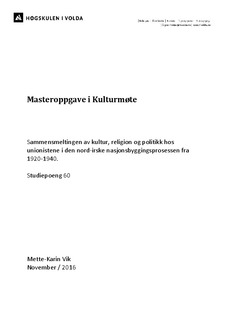| dc.contributor.author | Vik, Mette Karin | |
| dc.coverage.spatial | Northern Ireland | nb_NO |
| dc.date.accessioned | 2017-02-27T11:39:58Z | |
| dc.date.available | 2017-02-27T11:39:58Z | |
| dc.date.issued | 2016 | |
| dc.identifier.uri | http://hdl.handle.net/11250/2432159 | |
| dc.description.abstract | Summary
This thesis deals with the fusion of culture, religion and politics of the Unionists in the process of building Northern Ireland from 1920 to 1940. Northern Ireland was a highly segregated society and their education policy was therefore an important factor in the process of building the nation, in which both religious education and teaching of Irish and history got great significance. The teaching of religion in public schools took place mostly on the premises of the Protestants, which also led to negative consequences for the Catholic schools, among other things financially. The financial allocations to education in Irish disappeared also during this period, in addition to the teaching of British history at the expense of the Irish history. These factors made the Catholic influence in the process of building Northern Ireland minimal. The segregation in the society also became visible in how the Unionists looked at the Catholic and Nationalist minority’s place in Northern Ireland. A widespread discrimination against Catholics took place in terms of employment in both public and private services, change of constituencies which gave the Protestants majority and within parliament when representatives of the Nationalist Party met. Discrimination made the Catholic minority inferior in the new state and thus little participating in the process of building the nation. The Orange Order was very powerful in Northern Ireland during this period, both religiously and politically. The Order organized parades and elebrations that contributed to creating sectarian conflicts in the society. Many politicians from the Unionist Party were members of the Orange Order. The Order also contributed to the volunteer police force in Northern Ireland which gave the Order a key role as a link between religion, culture and politics and therefore also in the process of building the nation. Even though the Unionists wanted to show unity to prove strength, there were internal divisions within the Unionist Party in order to form an identity within the new nation. Protestants belonged to different denominations and the Unionists came from different social classes. There were also significant differences in terms of relations with the United Kingdom, where some were closely associated with the Union, but not to the British government because of its close cooperation with the Irish Free State and the Unionist’s fear of a merging between the “North” and “South”. These factors contributed to the shaping of an "Ulster" identity in relation to a British identity in the process of building Northern Ireland during the period 1920-1940. | nb_NO |
| dc.description.abstract | Sammendrag
Denne masteroppgaven omhandler sammensmeltingen av kultur, religion og politikk hos unionistene i den nord-irske nasjonsbyggingsprosessen fra 1920-1940. Nord-Irland var et svært segregert samfunn og utdanningspolitikken ble derfor en viktig faktor i nasjonsbyggingsprosessen der både religionsundervisningen og undervisningen i irsk og historie fikk svært sentrale roller. Religionsundervisningen i de offentlige skolene foregikk i stor grad på protestantenes premisser, noe som også førte til negative konsekvenser for de katolske skolene, blant annet økonomisk. De økonomiske bevilgningene til undervisningen i irsk forvant også i løpet av denne perioden, i tillegg til at det var et fokus på å undervise i den britiske historien på bekostning av den irske historien. Segregeringen i samfunnet kom også tydelig til syne i de unionistiske politikernes forhold til den katolske og nasjonalistiske minoritetens plass i Nord-Irland. En utstrakt diskriminering av katolikkene foregikk angående ansettelser både i offentlige og private næringer, endring av valgkretser som ga protestantene flertall og innenfor parlamentet da representantene til Nasjonalistpartiet møtte. Diskrimineringen var med på å gjøre den katolske minoriteten underlegen i den nye staten og dermed lite deltakende i nasjonsbyggingsprosessen. Oransjeordenen var en svært mektig aktør i Nord-Irland i denne perioden, både religiøst og politisk. Ordenen var blant annet arrangør av parader og feiringer som var med på å skape sekteriske motsetninger i samfunnet. De fleste av de sentrale politikerne fra Unionistpartiet var medlemmer i Oransjeordenen, noe de ikke la skjul på i det offentlige rom, i tillegg til at ordenen var en svært sentral aktør innenfor spesialstyrken, «B Specials», i Nord-Irland, noe som førte til at ordenen fikk en sentral rolle som bindeledd mellom religion, kultur og politikk og dermed også i nasjonsbyggingsprosessen. Selv om de unionistiske politikerne ønsket å stå samlet for å vise styrke, var det interne splittelser innad hos unionistene i identitetsdannelsen som foregikk samtidig med nasjonsbyggingen. Protestantene tilhørte ulike kirkesamfunn og de unionistiske politikerne kom fra ulike sosiale klasser. Det var også store forskjeller når det gjaldt forholdet til United Kingdom, der noen var nært knyttet til unionen, men ikke til den britiske regjeringen på grunn av et nært samarbeid med den irske fristaten og unionistenes frykt for sammenslåing. Disse faktorene var med på å påvirke formingen av «Ulster»-identiteten i forhold til den britiske identiteten i nasjonsbyggingsprosessen i Nord-Irland i perioden 1920-1940. | nb_NO |
| dc.language.iso | nob | nb_NO |
| dc.publisher | Høgskulen i Volda | nb_NO |
| dc.subject | Nord-Irland | nb_NO |
| dc.subject | nasjonsbygging | nb_NO |
| dc.subject | protestantar | nb_NO |
| dc.subject | katolikkar | nb_NO |
| dc.subject | diskriminering | nb_NO |
| dc.subject | segregering | nb_NO |
| dc.subject | kulturell identitet | nb_NO |
| dc.title | Sammensmeltingen av kultur, religion og politikk hos unionistene i den nord-irske nasjonsbyggingsprosessen fra 1920-1940 | nb_NO |
| dc.type | Master thesis | nb_NO |
| dc.rights.holder | forfatteren | nb_NO |
| dc.subject.nsi | VDP::Humanities: 000::Cultural science: 060::Anglo American cultural science: 068 | nb_NO |
| dc.subject.nsi | VDP::Humanities: 000::History: 070::Political history: 071 | nb_NO |
| dc.subject.nsi | VDP::Social science: 200::Sociology: 220 | nb_NO |
| dc.subject.nsi | VDP::Social science: 200::Political science and organizational theory: 240::Comparative politics: 241 | nb_NO |
| dc.source.pagenumber | 109 | nb_NO |
